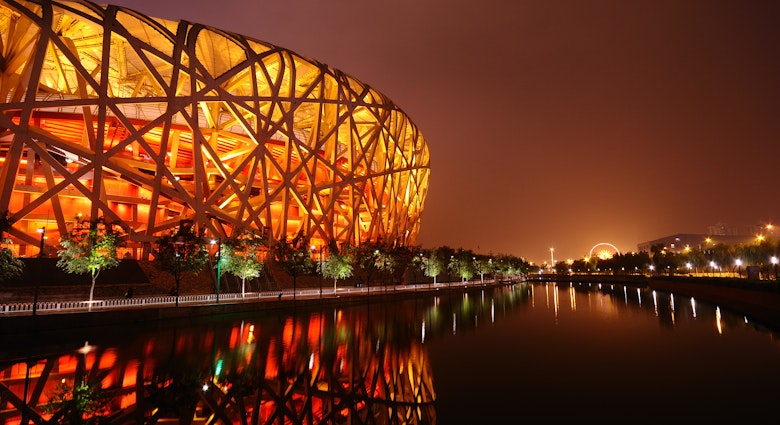
Nov 2, 2023 • 5 min read

Nollywood films are sold and watched everywhere © Joerg Boethling/Getty Images
For Nigeria and its people, Nollywood is the lens, capturing and reflecting the lives and times of over 200 million people, speaking up to 500 distinct languages, united by one national identity.
The term Nollywood was coined by New York Times journalist, Norimitsu Onishi, referring to the buzz of activity around straight to video, mass-produced, films that were being made by Nigerian artists and told stories about local audiences. Today, it is the second-largest film industry in the world. And as they say in Lagos, a city that typifies and inspires Nollywood, “Naija no dey carry last”.

Film as a language in Nigeria developed on a regional level. Traditional drama troupes across the country transitioned from the stage to the screen in the 1960s and 1970s. Eventually, production localized in cities like Lagos, Onitsha and Abuja, with amateur producers saturating the market with VHS tapes and later VCDs, of films inspired by the communities in which they were marketed.
Chris Obi Rapu’s Living in Bondage (1992), regarded as one the very first films of modern Nollywood, was by a traditional south-eastern troupe performing on tape.
Filmmakers developed a symbiotic relationship with their environment, using their cities as muses, amplifying their quirks and wonders. As it is with most things in Nigeria, Lagos magnifies this creative method. The city's skyline, beaches and nightlife, hold a special place in shaping and reflecting the way Nigeria is represented in the cinema.
Lagos is Africa's second-most populous city and the commercial capital of Nigeria. It is a regional hub for trade and culture and life here has its own fast-paced and exhilarating energy.
Whether you're exploring the growing art scene or fusion restaurants on the mainland or partying on the islands, Lagos meets you with unmatched energy.

Should you choose to visit Lagos, one of the best ways to get to know the city is on an Okada or a Keke (motorcycle taxi). This informal commercial transportation system is the quickest way to navigate and explore the dense and hectic urban environment of Lagos.
Motorcycles and tricycles are able to weave through traffic jams or bumpy backroads quicker than driving or commuting by bus at a fraction of the cost. In many Nollywood films, the ritual of hailing the okada, negotiating the fair, navigating by hand, or getting lost and enjoying the view on the back of a motorbike, is always present.
Nigerian filmmakers make it a point to include this occurrence, as it is unique to the city and immediately offers viewers a sense of place. Okada rides reflect the functional value of film and makes the experience of the place resonant.
In Nollywood pictures, the environment is a recurring theme used to filter and frame the stories of the different people who call it home. Although films are usually centered on people with plots around a moral or lesson, they also present an honest and inviting environment that gives their cinema a distinct tone.

The experience of a place like Lagos for instance feels more resonant even when just following someone as they look for their phone (Phone Swap is the film). Lekki or Freedom Park, for example, become recurring themes for filtering and framing the stories of the different people who call the city home. If you are interested in knowing what a Saturday on Tarkwa Bay feels like, there's probably a Nollywood film about it.
A Lagos wedding on any scale is an event you do not want to miss and Kemi Adetiba’s star-studded The Wedding Party (2016) is a modern classic that has got you covered. The plot is conventional, as is with a majority of Nollywood films, yet, the picture presents the industry at its finest in terms of production and distribution.
The glitz and glamour of an upscale Yoruba and Igbo wedding, showcase the fashion, food, music and comedy that make a Lagos wedding a special event. Here director Kemi Adetiba uses Lagos as a place of escape and comfort.
Genevieve Nnaji’s Sharon Stone (2002) is another great film for an introduction to the essence of Nollywood and its depiction of Lagos. This Lagos love story centers on Genevieve's character as she explores sexuality and love.
She's presented as a badass who lives her life in Lagos on her own terms, not bending to the men or the city and its morals. The film represents many young African women in large cities who are taking charge of their lives during a time when it seems like a risky thing to do.

Lagos is far from a perfect muse or home. However, it offers an exciting charge that leaves a lasting impression. Through Nollywood, you begin to regard and respect what makes for such a unique city, as well as the people who sustain it.
You attend weddings, witness traditional festivals and ride Okada’s through mind-numbing traffic to the beaches for solace. Watching some Nollywood films open's a peek into Nigeria's culture and most importantly, its people.
YouTube video player
Lagos is on our 2022 Best of Travel list. For more stories from some of the world’s most exciting destinations click here.
Safety recommendations and restrictions during a pandemic can change rapidly. Lonely Planet recommends that travelers always check with local authorities for up-to-date guidance before traveling during Covid-19.
You might also like:
Searching for clarity at a Nigerian art museum
Africa: what to expect on an overland tour
Where to go on your first safari in Africa


Nov 2, 2023 • 5 min read



Jul 10, 2022 • 6 min read



Feb 24, 2022 • 13 min read


Jan 10, 2022 • 7 min read